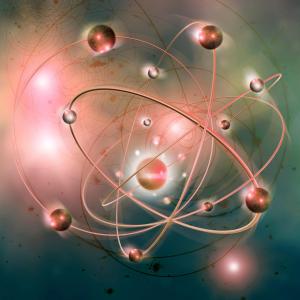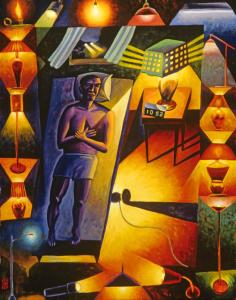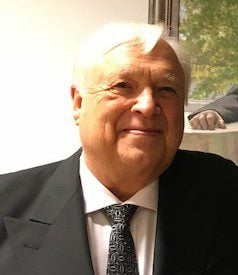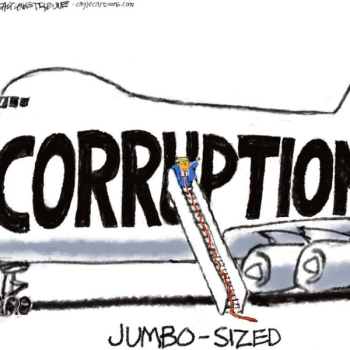What is truth in science and theology? Part Two
SR 4001

What is truth? This is the question we asked in an initial post, “What is truth?” Here is the answer I tendered there: Truth is the revelation and acceptance of what is genuinely real.
Then, in Part One of “What is truth in science and theology?“, we noted how both natural science and Christian theology thrive in democratic societies because of their assumptions: science relies on the verifiability of facts while faith relies on the divine promise of finally seeing the truth beyond the glass darkly. In his Faraday Paper on “Science, Religion, and Truth,” Oxford’s John Taylor tells us: “What unites science, religion, and philosophy at a very general level is that all aim to address our desire for explanation; for an understanding of the world we find ourselves in, of our own nature and of how we ought to live.” Both the scientist and the theologian seek explanatory adequacy.
In Part One, we distinguished between genuine science and pseudo-science. We critically examined the pseudo-archaeology theory in the ancient alien television series as an example. Here in Part Two, we will distinguish between genuine science and scientism. The public theologian should embrace genuine science yet eschew the materialist ideology at work in scientism.
“Scientism,” observes philosophical theologian Michael Dodds, O.P., “is fundamentally the transformation of the methodology of empirical science into a metaphysics, a move from the quantitative investigation of nature to the assumption that being is always quantitative. While the former is a legitimate methodology, the latter is mere ideology”(Dodds, 2012, 51n). Huston Smith, who taught for many years at MIT, agrees. He says “the problem is not science, but scientism—namely, to assume that what science turns up and can turn up is the sum of all there is”(Smith, 2003, 118). The public theologian must distinguish between genuine science and scientism, embracing the former yet eschewing the latter.
Scientific Propositions within a Holistic Worldview
Reliance on truth is extremely important to the public theologian, as we emphasized in Part One. Unless our society presupposes a commitment to reason and truth, averred Plato, we end up in mania. In other words, we go crazy. The body politic can avoid maniacal chaos through one of two means: either a democratic reverence for reason presupposing truth or, alternatively, rule by tyranny. Tyranny would impose a sacrificium intellectus (a sacrifice of intellectual integrity) through bullying. Frankly, I prefer the former.
As we’ve said repeatedly, both natural science and Christian theology thrive in democratic societies because of their assumptions: science relies on the verifiability of facts while faith relies on the divine promise of finally seeing the truth beyond the glass darkly. “Truth cannot contradict truth,” said Pope John Paul II (Pope 1998, 149). The scientists and theologians in our society must nourish themselves daily on a fare of truth. Or else they’ll go crazy. A constructive public theology includes the articulation of a truth-commitment as its contribution to the wider body politic and the common good.
Here is the point of this post on the topic of truth in science and theology: Trust in truth is something the public theologian shares with the natural scientist.
Yet, there is a bigger answer to the truth question than what we can demand from the scientist. The public theologian must engage the truth question at the level of worldview. Worldviews include more than facts. Worldviews include meaning, value, spirit, and moral mandates. Worldviews include ultimacy.
Treat science critically
I frequently distinguish between genuine science and scientism. The latter has an “…ism.” This means it is an ideology. Scientism as a materialist ideology posits two claims: (1) science is the only means to knowledge; and (2) material or physical reality is the only reality that exists. That is, science supports atheism.
My advice is this: the public theologian should embrace science yet eschew scientism.
Enter theologian Lisa Stenmark at San Jose State University. When Professor Stenmark engages in discourse clarification, she identifies how misleading assumptions are frequently made regarding just what science is and what religion is. Too frequently in the university setting it is assumed that science is neutral, impartial, objective, and free of ideology. In contrast, religion is assumed to be subjective, perspectival, and traditional. Watch out! Don’t get derailed by these assumptions, Stenmark warns us.
A closer look will demonstrate that science is more perspectival than is taken for granted. And, further, the theological articulation of religious belief is more rational than is taken for granted.
“Not only is science not a neutral, tradition-free framework, even if it were, that kind of objectivity is not the best way to make public decisions. The notions of neutrality and objectivity distort religious reasons, by expecting them to be couched in neutral terms, and suggest that people be disingenuous about their reasons for taking the positions they take” (Stenmark 2013, 4-5).
If scientists insist that they and they alone have a patent on fact and the sole right to determine truth, they will not only distort religious claims but deny themselves an ally in their war against untruth.
What attracts the public theologian is science as the ideal defender of facts alone. The ideal of science is to report on what we know about physical reality and then to stop before saying anything more. Scientism as a materialist ideology, in contrast, is actually pseudoscience. Scientism lurks like an invisible dragon in the laboratory, just waiting to spit fire.
Realism versus “shut up and calculate”

Reality’s self-revelation makes propositional truths or assertions possible. The kind of propositions we find in science points to reality’s self-disclosure within the framework of the experiment. But such propositions are so focused on individual facts that the more comprehensive horizon of reality slips to an almost invisible background. The world becomes concealed. Science gives us confirmable assertions, to be sure. But, the light of the facts allows the presence of the larger horizon of reality to slip into the shadows of the background.
We thank scientists for their factual knowledge. But the larger question of truth as the totality of reality escapes propositional designation. For the whole of truth, we must rely on worldview construction. We must ask for input from the philosopher and the theologian.
Not every scientist wants such input. Philosopher of science Massimo Pigliucci at the City College of New York divides scientists—quantum physicists–into two camps: the anti-realists and the realists. The anti-realists hold that “science is not in the business of arriving at truths about the world.” These anti-realists are simply satisfied with a mathematical theory that is reasonably accurate at predicting results. Their motto: “shup up and calculate.” The realists, by contrast, “think the whole point of science is to produce true statements about how the world actually works” (Pigliucci 2022, 23).
By the way, my physicist colleague, Carl Peterson, and I tried to demonstrate the value of critical realism in the discovery of the Higgs Boson a decade ago. If you’re interested, try our article, “The Higgs Boson: an Adventure in Critical Realism.”
From the Tiny Part to the Inclusive Whole of Reality
Scientists who are realists are more likely to welcome philosophical or theological speculation about the whole of reality. But the public theologian need not invite only the realist scientist to dinner. Whatever we learn from the “shut up and calculate” school still contributes material for worldview construction.
Just as the open grasslands seem to beckon the horse to escape beyond the corral, the question of reality as a whole calls the human mind to go beyond the fence erected by scientific reasoning. Mathematical cosmologist George F.R. Ellis and philosophical theologian Nancey Murphy remind us.
“The fundamental major metaphysical issues that purely scientific cosmology by itself cannot tackle–the problem of existence (what is the ultimate origin of physical reality?) and the origin and determination of the specific nature of physical laws–for these all lie outside the domain of scientific investigation” (Murphy 1996, 61).
“The Truth is deeper than facts,” we find a Patheos columnist telling us. To live in the truth we need the facts. And, we need what’s deeper than the facts. And, in addition, we need the most comprehensive horizon of reality to provide the context for these facts. These facts about facts propel the theologian toward “the reconstruction of a unified worldview” (Murphy 1996, 7).
Such worldview construction is important to the systematic theologian, as Randy Alcorn, a Patheos columnist, makes clear. “I think it’s impossible to teach theology without teaching worldview, and impossible to teach worldview without teaching theology, and in particular, systematic theology.” Alcorn adds that coherence of ideas within this worldview are important. “We have a thirst for knowledge, and knowledge consists of seeing truths in relationship to each other. We do not just need the individual pearls of truths; we need the string that ties them together.“
The theologian and perhaps the philosopher too will be quick to point out that the most coherent understanding of the many scientific propositions which disclose nature’s secrets requires a worldview inclusive of nature’s creator, God. A worldview that incorporates both God and what we learn about nature through science is more comprehensive and more intelligible than science without God-reference can provide.
What is truth in science and theology? One of my favorite answers appears in the work of physicist-theologians Robert John Russell and Kirk Wegter-McNelly.
“Science at its best, and theology at its best, both pursue truth….If it be true, as theologians claim, that the God of Israel is the creator of this magnificent universe, then every truth about this universe discovered by science only enhances appreciation for God’s creative handiwork” (Russell and McNelly, 2004, 36).
So, when we ask, “what is truth?,” we are asking that genuine reality reveal itself to us. This happens in science, we trust. This happens in faith, we also trust. How might these cohere with one another in worldview construction?
Conclusion
Public theology, I say often, is conceived in the church, critically refined in the academy, and offered to the wider culture for the sake of the global common good. This is how I carry on the legacy of my University of Chicago mentor, David Tracy, for whom: “Theology is distinctive among the disciplines for speaking to and from three distinct publics: academy, church, and the general culture” (Tracy, The Role of Theology in Public Life: Some Reflections 1984, 230). In short, theology is public discourse on the implications of the faith which takes place where the entire world can overhear. This is why asking about truth in science and theology is important.
In this post we have distinguished between genuine science and scientism. Science produces new and wonderful knowledge about the natural world. We should thank God for our scientists! Scientism, on the other hand, is a materialist ideology that is unnecessarily added to the science. In his Faraday Paper, “Understanding Science, Scientism, and Religion,” Ian Hutchinson tells us: “Scientism underlies a variety of philosophical positions opposed to religion: the naturalistic claim that there is no divine agency, materialism, ontological reductionism, and so on.” Science, yes. Scientism, no.
In light of the social turmoil stirred up by the post-truth forces at work in the webmind and pseudoscience, I recommend Christians and other religious leaders pledge allegiance to the scientific community. I also recommend the public theologian engage in discourse clarification to distinguish genuine science from both pseudoscience and scientism. I further recommend that the public theologian engage in worldview construction, placing genuine propositional knowledge gained from science into a comprehensive framework wherein human meaning is oriented toward what has been revealed about the God of grace.
▓

Ted Peters directs traffic at the intersection of science, religion, and ethics. Peters is an emeritus professor at the Graduate Theological Union, where he co-edits the journal, Theology and Science, on behalf of the Center for Theology and the Natural Sciences, in Berkeley, California, USA. He authored Playing God? Genetic Determinism and Human Freedom? (Routledge, 2nd ed., 2002) as well as Science, Theology, and Ethics (Ashgate 2003). Along with Martinez Hewlett, Joshua Moritz, and Robert John Russell, he co-edited, Astrotheology: Science and Theology Meet Extraterrestrial Intelligence (2018). Along with Octavio Chon Torres, Joseph Seckbach, and Russell Gordon, he co-edited, Astrobiology: Science, Ethics, and Public Policy (Scrivener 2021). He is also author of UFOs: God’s Chariots? Spirituality, Ancient Aliens, and Religious Yearnings in the Age of Extraterrestrials (Career Press New Page Books, 2014). See his website: TedsTimelyTake.com.
▓
References
Dodds, Michael, 2012. Unlocking Divine Action. Washington: Catholic University of America Press.
Murphy, Nancey, and George Ellis. 1996. On the Moral Nature of the Universe: Theology, Cosmology, and Ethics. Minneapolis MN: Fortress Press.
Peters, Ted. 2021. “Public Theology, Discourse Clarification, and Worldview Construction.” Theology and Science 19:1 1-4; DOI.org/10.1080/14746700.2020.1869672 .
Peters, Ted. 2018. “Public Theology: Its Pastoral, Apologetic, Scientific, Politial, and Prophetic Tasks.” International Journal of Public Theology 12:2 153-177; https://brill.com/abstract/journals/ijpt/12/1/ijpt.12.issue-1.xml.
Pigliucci, Massimo. 2022. “What Does It Mean to ‘Interpret’ Quantum Mechanics?” The Skeptical Inquirer 46:4 23-24.
Pope, John Paul II. 1998. “Evolution and the Living God.” In Science and Theology: The New Consonance, by ed Ted Peters, 149-152. Boulder CO: Harper/Westview https://www.ewtn.com/library/PAPALDOC/JP961022.HTM.
Russell, Robert John, and Kirk Wegter-McNelly, 2004. “Science and Theology: Mutual Interaction.” Bridging Science and Religion, eds., Ted Peters, Gaymon Bennett, and Kang Phee Seng. London: SPCK.
Smith, Huston, 2003. The Way Things Are. Berkeley CA: University of California Press.
Stenmark, Lisa. 2013. Religion, Science, and Democracy: A Disputational Friendship. Lanham MA: Lexington.
Stoddard, Eric. 2008. “Yes, no, cancel: clicking our way to a public theology of cyberdemocracy.” International Journal of Public Theology 2:3 328-353.
Tracy, David. 1984. “The Role of Theology in Public Life: Some Reflections.” Word and World 4:3 230-239.
Weiss, Rick. 27 October 2017. “Nip Misinformation in the Bud.” Science 358:6362 427.













